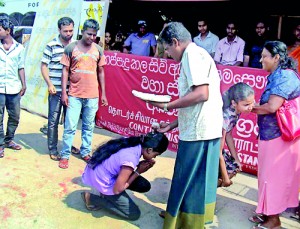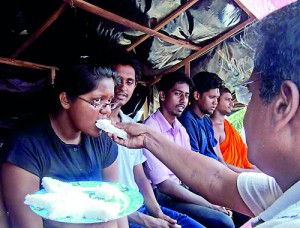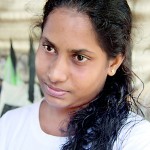News
For protesting students, cause is bigger than Avurudu
Every year, April brings about a cheery and festive mood to Ishara’s residence. The National New Year celebrations are extra festive in her family as it is her birthday too. But this year was different. Her parents were alone during the New Year and celebrations were on low key because Ishara, a first year Allied Health Sciences student at the University of Ruhuna did not come home for Avurudu.

A protesting student worships her father in keeping with New Year traditions
Instead she spent the day with her fellow university students — not to celebrate the New Year or her birthday, but to take part in an ongoing protest campaign. This was the first time that Ishara has not celebrated New Year with her parents. She felt the cause was greater than the Avurudu.
The protest campaign was on its 110th day when the New Year dawned, and, like Ishara, many other Allied Health Sciences Students from the Peradeniya and Ruhuna Universities spent their New Year in makeshift huts. One group was outside the Fort railway station, another in front of the University Grants Commission, and a third at the Ruhuna campus. All focused on one common goal: To persuade the Ministry of Higher Education to make their three-year degree course a four-year course. “I have never stayed away from home during New Year time. But my parents supported the students’ cause and understood that we had to do this,” said Ishara.
On New Year’s day, a few parents visited their children at the protest sites outside the Fort railway station and the UGC, sharing with them traditional sweetmeats and kiribath. But the scene failed to move the authorities. Instead they are involved in a tug-of- war over the issue.
“We have only been given one meeting with the Higher Education Ministry Secretary. But we hear the ministry has held many meetings with other stakeholders without us,” Allied Health Sciences Students’ Union Secretary Lahiru Madhusanka said.

A morsel of Kiribath for protesting undergrads
He said Ministry Secretary Sunil Jayantha Nawaratne had told them that the ministry was willing to increase the number of academic years to four but the Government Medical Officers’ Association (GMOA) was opposed to the move.
Dr. Nawaratne said his hands were tied regarding the matter as the ministry had to abide by a Supreme Court decision.
“The ministry is willing to increase the academic years but the GMOA is opposed to it. The students have to go for training to hospitals and the doctors have refused to train them under a four-year degree programme,” he said.

Student Union leader Lahiru Madhusanka says the ministry takes decisions without consulting the students
The two universities offer a general degree in allied health sciences. Students who achieve a grade point average (GPA) of more than 2.8 are allowed to follow a special degree which requires them to study one more year.
The GMOA says the current system should continue, although it has raised questions over the quality of the degree. GMOA President Dr. Anurudda Padeniya said the present allied health sciences curriculum was not

No New Year’ day celebrations for birthday girl Ishara. Pix by Indika Handuwela
up to international standards and increasing the academic years from three to four would not automatically bring about international accreditation.
“Dr. Nawaratne told me not to worry, even if they make it four years it would be the same subject matter taught stretched over four years instead of three. I questioned the quality of this degree but no one is paying any heed,” Dr. Padeniya said.
Claiming that the GMOA was the only body which had done a thorough analysis of the issue, he said that the ministry should aim to improve the quality of degrees offered without taking political decisions.
“Last year a US delegation visited Sri Lanka to recruit 8000 paramedical professionals, and they only recruited eight individuals. The rest they recruited from India. This speaks volumes about our so-called higher education and training,” Dr. Padeniya said.

